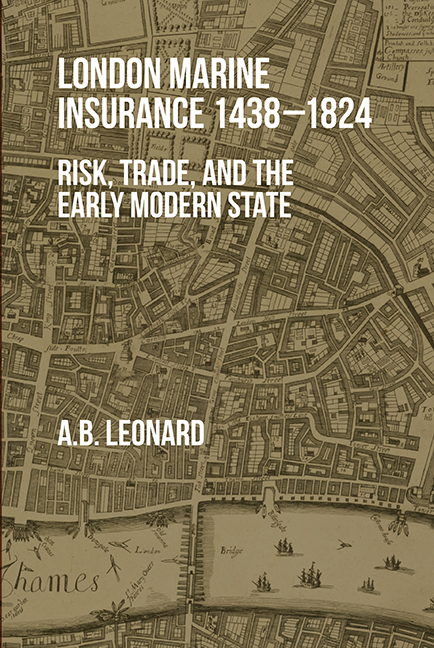Book contents
- Frontmatter
- Contents
- List of Illustrations
- Preface
- Glossary of marine insurance terms
- Introduction
- 1 The merchant-insurers’ system: London marine insurance to the 1570s
- 2 1570–1688: Buyers and the first intervention
- 3 1688–1720: The sellers’ intervention
- 4 To 1824: Lloyd’s and the common law
- 5 Conclusions
- Appendix: Some London underwriters active 1690–1717
- Bibliography
- Index
1 - The merchant-insurers’ system: London marine insurance to the 1570s
Published online by Cambridge University Press: 26 May 2022
- Frontmatter
- Contents
- List of Illustrations
- Preface
- Glossary of marine insurance terms
- Introduction
- 1 The merchant-insurers’ system: London marine insurance to the 1570s
- 2 1570–1688: Buyers and the first intervention
- 3 1688–1720: The sellers’ intervention
- 4 To 1824: Lloyd’s and the common law
- 5 Conclusions
- Appendix: Some London underwriters active 1690–1717
- Bibliography
- Index
Summary
London's original institutions surrounding the business of insurance were shaped according to its character as a club good traded among merchant-insurers for their mutual benefit. The merchants agreed to and accepted the complex rules governing contracts. Interpretation and modification of the rules based on circumstance usually remained in the hands of the same merchant-insurers. England did not formally adopt a codification of insurance regulations during the period under review. Instead, insurance contracts and markets operated under the principles of the relevant Lex Mercatoria, the Law Merchant, a body of commercial rules of conduct inherited from Italy and elsewhere in Continental Europe. Enforcement of the rules of the game was typically carried out within the community of merchant-insurers through arbitration.
This chapter describes the introduction of insurance into London in the fifteenth and sixteenth centuries, and shows how the Law Merchant, developed elsewhere to govern its usage, was both flexible and regularly amended and adapted to suit merchants’ needs. These origins are important to understanding the future interventions which shaped the ongoing development of London insurance, and contributed to its primacy. The rules in London evolved slightly differently from those of other underwriting centres, which was one source of the city's advantage. Despite these modifications, however, the basic institutional structures and customary practices developed by the late medieval Italian merchant-insurers continued to be employed by London underwriters throughout the period of review. Ensuring the continuity of these practices was a key goal (or, in one case, the unintended consequence) of the interventions described in this book. While authorities in other important local marine insurance trading centres adopted fixed legal codes to govern market practice, London merchant-insurers were not constrained in this way. Their institution-building cooperation with the state prevented this, sometimes privately but often publicly, as will be shown. Further, merchant experts, rather than a state judiciary, were typically called upon to interpret and enforce the body of customary mercantile law in use in London.
As the city's insurance market grew in size, volume, and importance, weaknesses in the adopted system of self-governance became apparent, revealing the merchant-insurers’ inability to manage the actions of outsiders in a market which had evolved to facilitate trade in a club good.
- Type
- Chapter
- Information
- London Marine Insurance 1438-1824Risk, Trade, and the Early Modern State, pp. 33 - 72Publisher: Boydell & BrewerPrint publication year: 2022

